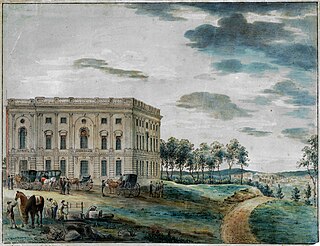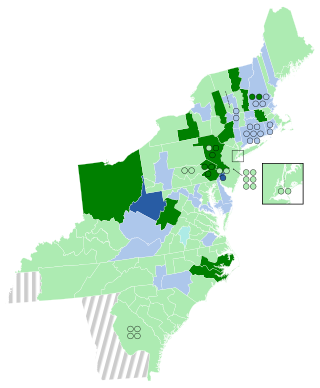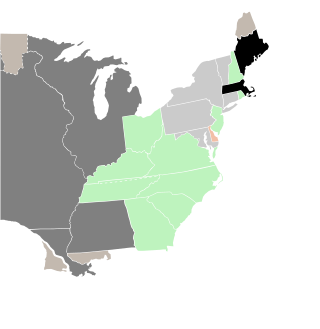
The 11th United States Congress was a meeting of the legislative branch of the United States federal government, consisting of the United States Senate and the United States House of Representatives. It met in Washington, D.C. from March 4, 1809, to March 4, 1811, during the first two years of James Madison's presidency. The apportionment of seats in the House of Representatives was based on the 1800 United States census. Both chambers had a Democratic-Republican majority.

The 12th United States Congress was a meeting of the legislative branch of the United States federal government, consisting of the United States Senate and the United States House of Representatives. It met in Washington, D.C. from March 4, 1811, to March 4, 1813, during the third and fourth years of James Madison's presidency. The apportionment of seats in the House of Representatives was based on the 1800 United States census. Both chambers had a Democratic-Republican majority.

The 1812–13 United States House of Representatives elections were held on various dates in various states between August 3, 1812 and April 30, 1813. Each state set its own date for its elections to the House of Representatives before the first session of the 13th United States Congress convened on May 24, 1813. They coincided with James Madison being re-elected president.

The 1810–11 United States House of Representatives elections were held on various dates in various states between April 24, 1810 and August 2, 1811. Each state set its own date for its elections to the House of Representatives before the first session of the 12th United States Congress convened on November 4, 1811. They occurred during President James Madison's first term. Elections were held for all 142 seats, representing 17 states.

The 1810–11 United States Senate elections were held on various dates in various states. As these U.S. Senate elections were prior to the ratification of the Seventeenth Amendment in 1913, senators were chosen by state legislatures. Senators were elected over a wide range of time throughout 1810 and 1811, and a seat may have been filled months late or remained vacant due to legislative deadlock. In these elections, terms were up for the senators in Class 2.

The 1810 United States House of Representatives elections in New York were held from April 24 to 26, 1810, to elect 17 U.S. Representatives to represent the State of New York in the United States House of Representatives of the 12th United States Congress. At the same time, a vacancy was filled in the 11th United States Congress.

The 1812 United States House of Representatives elections in New York were held from December 15 to 17, 1812, to elect 27 U.S. Representatives to represent the State of New York in the United States House of Representatives of the 13th United States Congress. At the same time, a vacancy was filled in the 12th United States Congress.

The 1814 United States House of Representatives elections in New York were held from April 26 to 28, 1814, to elect 27 U.S. Representatives to represent the State of New York in the United States House of Representatives of the 14th United States Congress.

Kentucky elected its members August 6, 1810.

Maryland held its elections October 1, 1810.

Vermont elected its members November 4, 1810.

New Hampshire law required a candidate to receive votes from a majority of voters (10%). In the August 27, 1810 initial election, only two candidates won a majority, so a second election was held April 1, 1811 for the remaining three seats, after the congressional term began but before the Congress formally convened. The data from the source used give majorities to all the top five candidates, suggesting that the data are incomplete.

Georgia elected its members on October 1, 1810.

North Carolina elected its members August 9, 1810.

Louisiana held its first United States House of Representatives elections following its April 1812 admission to the Union on September 28–30, 1812. A special election for a seat in the 12th Congress and a general election for a seat in the 13th Congress were held at the same time, and had nearly-identical results.

South Carolina elected its member October 8–9, 1810.
Massachusetts held its elections November 5, 1810. Massachusetts law required a majority for election. This was not met in the 15th district necessitating a second election on April 1, 1811.

Ohio elected its member October 9, 1810. This was the last election in which Ohio had a single at-large district. Due to rapid population growth in the state, the at-large district had become disproportionately populous by this point.